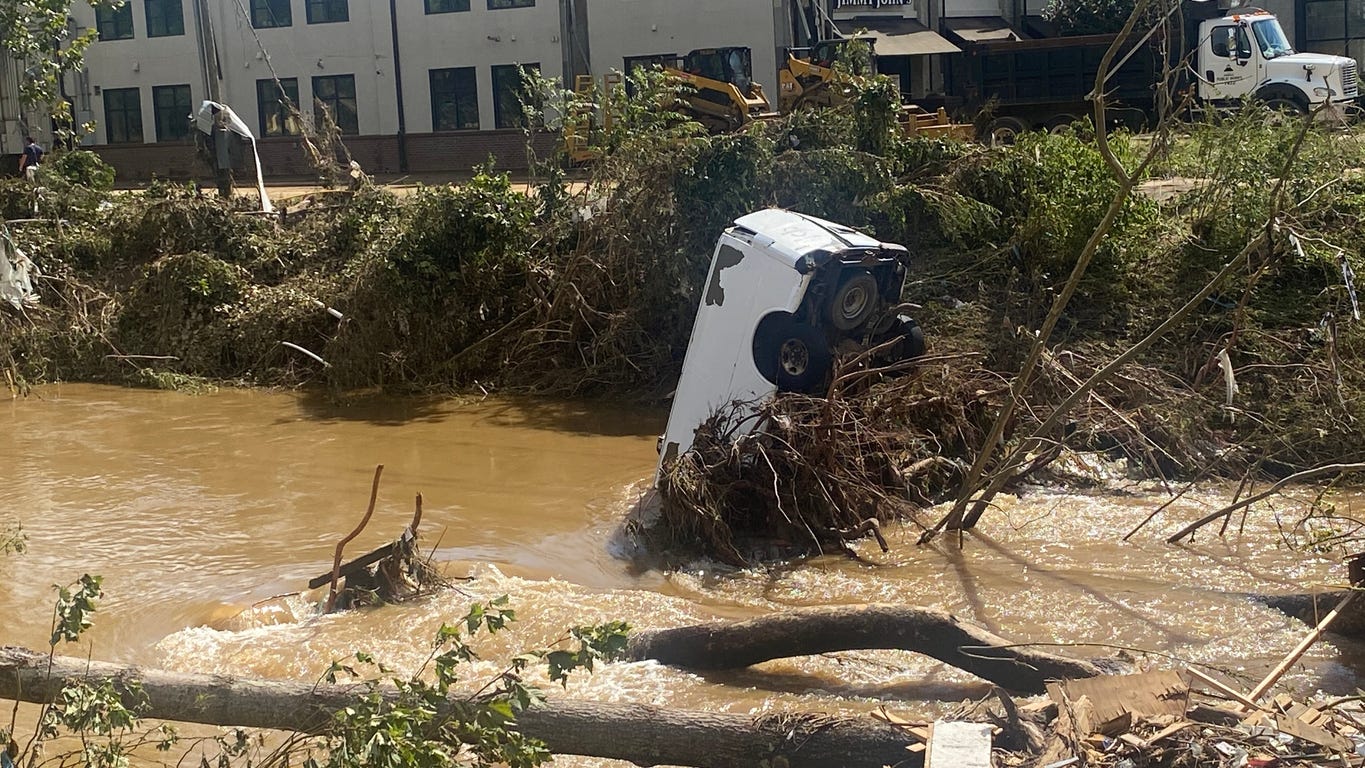Estimates of the cost to rebuild after Hurricane Helene run to 26 billion USD.
Scientists estimate that climate change increased Hurricane Helene's rainfall by up to 50% in NC and made the event up to 20x more likely. (Berkeley Livermore Lab via Leah Stokes tweet, Oct 1)
The system traditionally used to fund natural disaster recovery is stressed to the breaking point and needs a rethink. We are familiar with funding the cost of cleanup and rebuilding through FEMA, insurers, and municipal bonds. Ideally, the system works like this:
· FEMA provides immediate funds (grants) in the aftermath of a disaster for victims’ basic food and shelter needs. Then provides some compensation for losses.
· Homeowners and businesses who sustain damages file claims with their insurers. Insurers pay the claims and homes and businesses rebuild.
· Municipalities raise money to repair and rebuild damaged facilities, like roads and bridges and water treatment plants, by issuing municipal bonds.
Deep cracks are appearing in this system. Each element (FEMA, property insurance, and municipal bonds) is showing signs of stress from the increased rate and scope of climate change-fueled disasters.
Homeland Security Secretary, Alejandro Mayorkas, has warned that FEMA won’t have enough funds to make it through the hurricane season after taking care of Helene victims. (AP Oct 1)
Home insurers are getting skittish and home insurance markets are getting chaotic. Insurers are raising rates, limiting coverage, and pulling out of some markets entirely. States are cobbling together “last resort” insurance plans that are often inadequate.
Some homeowners who don’t have mortgages that require insurance are going without, or “self-insuring” -- only for those who are wealthy enough to walk away from disaster.
Municipal bonds are stressed by increasing demand for restoration funds following natural disasters. The U.S. Senate Budget Committee held a hearing this year on “Safeguarding Municipal Bonds from Climate Risk.”
Pimco, an investment firm specializing in fixed income, is questioning “whether climate concerns have rendered some munis inappropriate for lower-risk portfolios,” as there have been defaults (WSJ, 9/26/2024).
We need to call it what it is, Climate Damage, and accelerate the conversation about how to finance the recovery of bigger, more frequent events. I see three funding strategies emerging.
Strategy #1: Everyone for Themselves
Go without home insurance. Move to a less vulnerable place --good luck! Ashville, N.C. was cited a few years ago as a climate safe place to go.
Use the services of AlphaGeo (https://alphageo.ai) to find a location where your home or business asset has the best chance of appreciating without being destroyed by a natural disaster.
This is the current and default strategy in the absence of anything else.
Strategy #2: Make Big Oil Pay
MakeBigOilPay.org lobbies to mandate oil company contributions to climate mitigation and disaster recovery funds. Their template is the so-called “Superfunds” that required polluting companies to fund the cleanup of toxic waste sites.
Both federal and state governments (Vermont, New York, Massachusetts, Maryland, California) have proposed legislation to establish Climate Superfunds. Vermont has made it into law. This strategy is mostly supported by progressive groups, including:
Working Families Party, League of Conservation Voters, Chesapeake Climate Action Network, Sunrise Movement, 350.org, Greenpeace USA, and Hip Hop Caucus.
Strategy #3: Carbon tax and dividend.
This strategy aims to capture market forces by putting a price on carbon as it is emitted so that polluters pay and have an incentive to reduce emissions. The carbon fee creates a revenue stream that could be used to help offset the costs of disaster mitigation and recovery — although I am not sure anyone is talking about that use of revenues yet.
The advantage of this strategy is that it has the support of bipartisan organizations including Citizen’s Climate Lobby, RepublicEn, Americans for Carbon Dividends, The US Conference of Mayors as well as some members of Congress and Elon Musk. (Elon supports carbon tax)
Postscript
I had an exchange with another reader in the comment section following a news article about disaster-related problems with homeowner’s insurance. My co-commenter concluded his post by saying “The hoax is expensive”. Only it isn’t a hoax.




